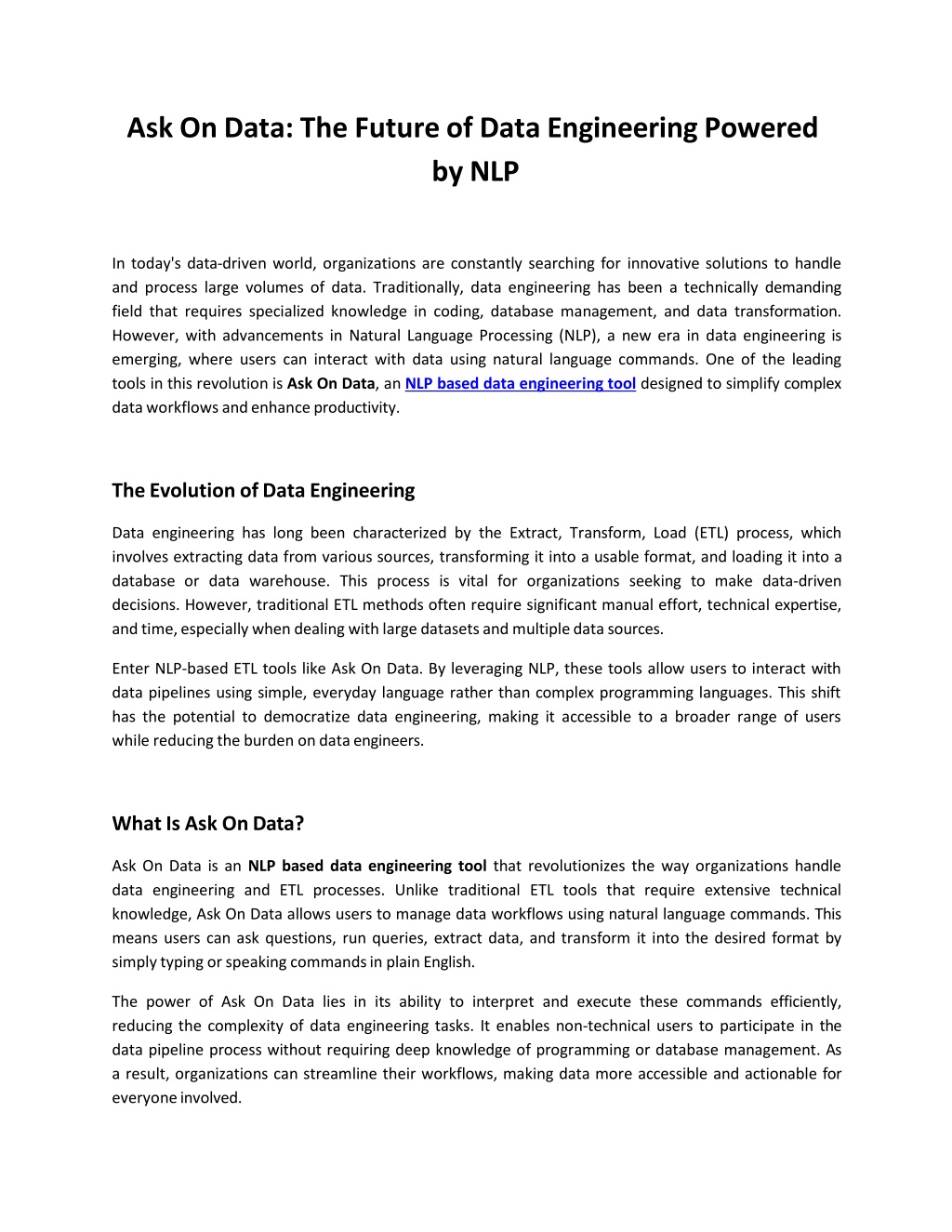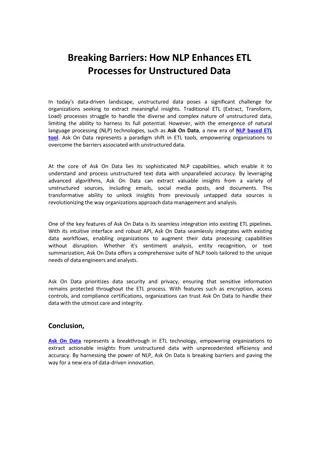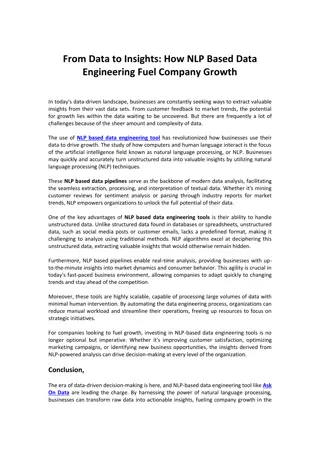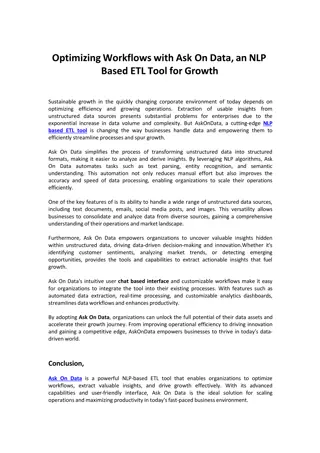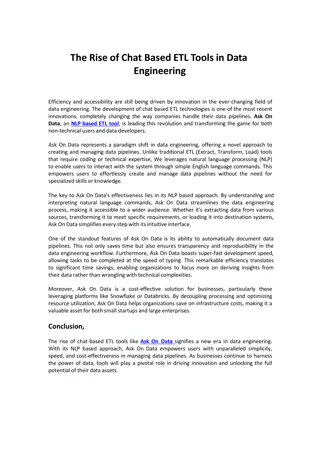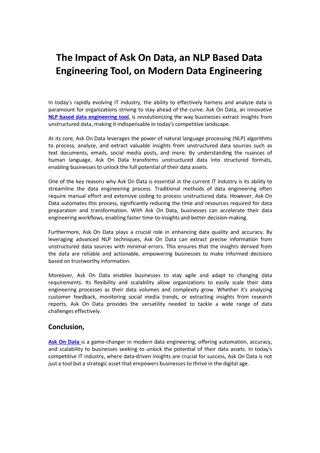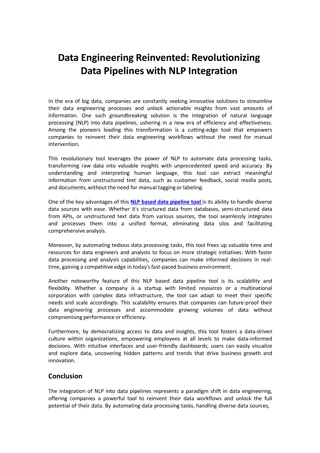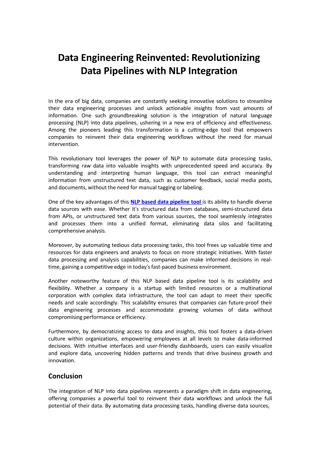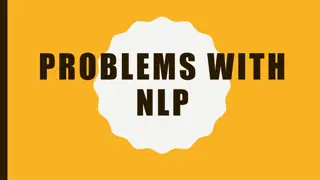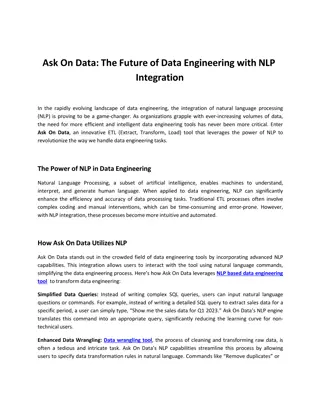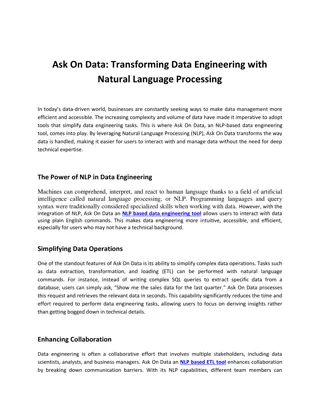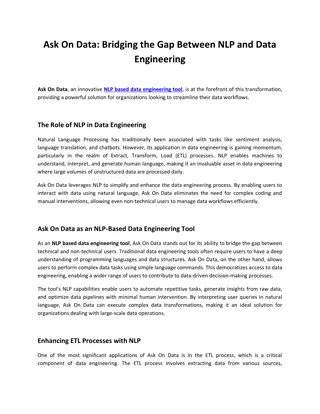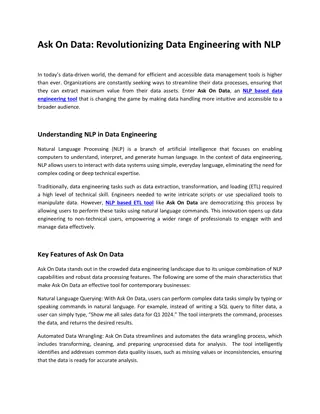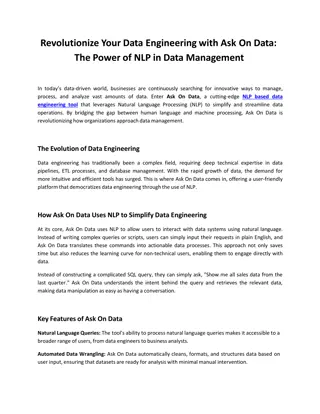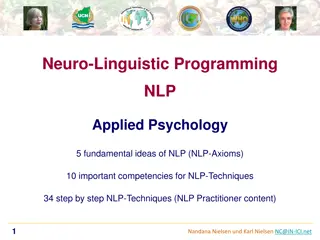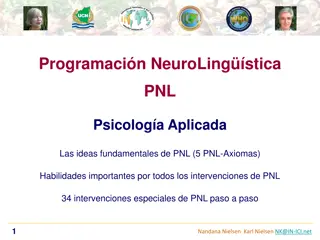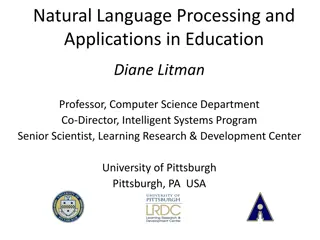Ask On Data The Future of Data Engineering Powered by NLP
One of the leading tools in this revolution is Ask On Data, an NLP based data engineering tool designed to simplify complex data workflows and enhance productivity.
Download Presentation

Please find below an Image/Link to download the presentation.
The content on the website is provided AS IS for your information and personal use only. It may not be sold, licensed, or shared on other websites without obtaining consent from the author.If you encounter any issues during the download, it is possible that the publisher has removed the file from their server.
You are allowed to download the files provided on this website for personal or commercial use, subject to the condition that they are used lawfully. All files are the property of their respective owners.
The content on the website is provided AS IS for your information and personal use only. It may not be sold, licensed, or shared on other websites without obtaining consent from the author.
E N D
Presentation Transcript
Ask On Data: The Future of Data Engineering Powered by NLP In today's data-driven world, organizations are constantly searching for innovative solutions to handle and process large volumes of data. Traditionally, data engineering has been a technically demanding field that requires specialized knowledge in coding, database management, and data transformation. However, with advancements in Natural Language Processing (NLP), a new era in data engineering is emerging, where users can interact with data using natural language commands. One of the leading tools in this revolution is Ask On Data, an NLP based data engineering tool designed to simplify complex data workflows and enhance productivity. The Evolution of Data Engineering Data engineering has long been characterized by the Extract, Transform, Load (ETL) process, which involves extracting data from various sources, transforming it into a usable format, and loading it into a database or data warehouse. This process is vital for organizations seeking to make data-driven decisions. However, traditional ETL methods often require significant manual effort, technical expertise, and time, especially when dealing with large datasets and multiple data sources. Enter NLP-based ETL tools like Ask On Data. By leveraging NLP, these tools allow users to interact with data pipelines using simple, everyday language rather than complex programming languages. This shift has the potential to democratize data engineering, making it accessible to a broader range of users while reducing the burden on data engineers. What Is Ask On Data? Ask On Data is an NLP based data engineering tool that revolutionizes the way organizations handle data engineering and ETL processes. Unlike traditional ETL tools that require extensive technical knowledge, Ask On Data allows users to manage data workflows using natural language commands. This means users can ask questions, run queries, extract data, and transform it into the desired format by simply typing or speaking commands in plain English. The power of Ask On Data lies in its ability to interpret and execute these commands efficiently, reducing the complexity of data engineering tasks. It enables non-technical users to participate in the data pipeline process without requiring deep knowledge of programming or database management. As a result, organizations can streamline their workflows, making data more accessible and actionable for everyone involved.
How Does Ask On Data Work? Ask On Data functions as a natural language interface that sits on top of an organization s data infrastructure. By processing natural language commands, it can execute data tasks like querying, filtering, and transforming data without needing traditional SQL or Python scripts. For example, a user could type or ask, "Extract all sales data from January 2024," and Ask On Data would handle the extraction and transformation of that data without any manual coding. It also supports various data sources, including cloud-based storage, relational databases, and APIs. This flexibility makes it a powerful tool for handling diverse datasets, from structured to unstructured data, all managed through a conversational interface. Benefits of NLP-Based Data Engineering Tools The rise of NLP based ETL tool like Ask On Data offers several key benefits to organizations: Accessibility: Users no longer need to be data engineers or programming experts to work with data. By leveraging natural language commands, more employees can engage with and utilize data for insights and decision-making. Efficiency: Automating complex ETL processes reduces the time spent on manual coding, error checking, and debugging. Tasks that would normally take hours or days can now be completed in a fraction of the time. Error Reduction: Manual data handling is prone to errors, especially in complex ETL pipelines. NLP- based tools can mitigate these risks by automating tasks and ensuring data accuracy through consistent processing. Cost Savings: By enabling non-technical users to manage data workflows, organizations can reduce the reliance on highly specialized (and often costly) data engineers for routine tasks. Scalability: NLP-based data engineering tools can easily scale as data volumes grow, making them suitable for enterprises handling massive amounts of data across multiple sources. Ask On Data in the Future of Data Engineering Ask On Data is not only a powerful NLP-based ETL tool, but it also represents the future of how data engineering can evolve to be more intuitive, efficient, and user-friendly. As organizations continue to generate and rely on data for strategic decisions, tools like Ask On Data will play an essential role in bridging the gap between data engineers and non-technical users.
By empowering users to interact with data using natural language, Ask On Data unlocks new possibilities for improving productivity, enhancing collaboration, and ultimately driving better business outcomes. In a landscape where data is increasingly becoming a critical asset, tools like Ask On Data are paving the way for a future where data engineering is accessible to all. Conclusion The future of data engineering is bright, with NLP-based data engineering tools like Ask On Data at the forefront of innovation. As more organizations adopt these tools, the barriers to effective data management will continue to diminish, enabling faster, more accurate, and more impactful decision- making across industries.
